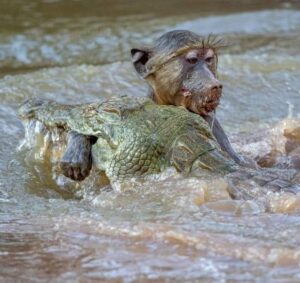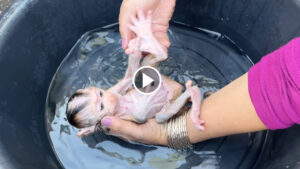Teaching a monkey to be smart involves nurturing their natural intelligence through mental stimulation, training, socialization, and positive reinforcement. Monkeys are highly intelligent animals with great problem-solving skills, and they learn quickly when provided with the right environment. Here’s how you can help a monkey grow smarter:
### 1. **Mental Stimulation through Enrichment**
Providing an environment that stimulates a monkey’s mind is crucial for their development.
– **Toys and Puzzles**: Use interactive toys, such as puzzle feeders, to challenge them to solve problems to get rewards. This engages their cognitive skills.
– **Foraging Games**: Hide food around their environment, encouraging them to search and problem-solve as they would in the wild. Foraging helps them think and engage with their surroundings.
– **Varied Sensory Experiences**: Provide toys and objects with different textures, colors, and sounds to stimulate their senses and promote curiosity.
### 2. **Positive Reinforcement Training**
Training a monkey using positive reinforcement helps them learn new behaviors and tricks while stimulating their intelligence.
– **Rewards**: Use small, healthy treats or verbal praise to reward good behavior. Monkeys quickly learn to associate specific actions with positive outcomes.
– **Clicker Training**: A clicker makes a consistent sound that signals the monkey has performed the correct behavior, followed by a reward. This method speeds up learning.
– **Start with Simple Tasks**: Teach basic commands such as “come,” “sit,” or “stay” before progressing to more complex tricks or tasks. Gradual learning helps build confidence.
– **Teach by Imitation**: Monkeys are great mimics. Demonstrate actions, such as picking up an object or opening a container, and encourage the monkey to copy you. Over time, they will learn by observing.
### 3. **Socialization and Learning from Others**
Monkeys are social animals that learn best when interacting with others.
– **Interact Regularly**: Spend quality time with the monkey to build trust and create a bond. Regular interaction helps them learn from your behavior and cues.
– **Encourage Interaction with Other Monkeys**: If possible, allow the monkey to spend time with other primates. Monkeys learn essential social and survival skills by observing and mimicking their peers.
– **Playtime**: Play is critical for learning and mental development. Engage the monkey in games like tug-of-war, hide-and-seek, or fetch to build problem-solving skills and strengthen your bond.
### 4. **Encouraging Problem-Solving**
Problem-solving is key to making a monkey smarter. Set up challenges that encourage them to think.
– **Food Puzzles**: Hide food in complex puzzles or inside containers that require effort to open. This makes them use their intelligence to access the food.
– **Task-Oriented Games**: Teach the monkey to perform specific tasks, like unlocking simple mechanisms, stacking blocks, or matching objects. Gradually increase the difficulty of these tasks as they progress.
– **Trial and Error Learning**: Let the monkey explore solutions on their own before providing help. They learn valuable lessons through trial and error.
### 5. **Exploration and Environmental Enrichment**
Giving a monkey the freedom to explore different environments helps boost their curiosity and problem-solving skills.
– **New Environments**: Regularly introduce the monkey to new surroundings or play areas. This could be a new room, an outdoor space, or a different part of their enclosure.
– **Provide Natural Elements**: Let the monkey explore natural items like branches, leaves, or stones. This fosters their natural instincts and helps them develop a connection to their environment.
### 6. **Communication Skills**
Monkeys communicate through a variety of vocalizations, gestures, and facial expressions. Encouraging communication helps their social intelligence.
– **Use Simple Commands**: Speak to the monkey using simple, consistent words for commands. They can learn to associate sounds with actions over time.
– **Respond to Their Gestures**: Monkeys often use body language to communicate. Learn to understand their signals and respond appropriately. This encourages them to communicate more effectively.
– **Encourage Imitation**: Monkeys naturally mimic behaviors. Use gestures and actions that the monkey can imitate, reinforcing communication and cognitive development.
### 7. **Structured Routines**
A structured routine helps a monkey understand expectations and increases their learning capacity.
– **Consistent Schedule**: Establish a consistent daily routine for feeding, play, training, and rest. Predictability reduces stress and allows the monkey to focus on learning new skills.
– **Repetition and Practice**: Repeat commands and tasks regularly until the monkey masters them. Monkeys thrive on practice, and repetition helps reinforce what they’ve learned.
### 8. **Teach Sign Language (Optional)**
Some species of monkeys and great apes have been successfully taught basic sign language.
– **Use Simple Signs**: If you want to go beyond vocal commands, you can teach a monkey basic signs for words like “food,” “water,” or “play.” This requires consistent repetition and reinforcement.
– **Reward Communication**: Each time the monkey uses a sign correctly, reward them with praise or a treat. This encourages further use of signs.
### 9. **Health and Nutrition**
A healthy monkey is more likely to learn effectively. Ensure they are in good health with:
– **Proper Diet**: Feed the monkey a balanced diet that includes fruits, vegetables, proteins, and, if recommended by a vet, specialized monkey food. Proper nutrition supports brain development.
– **Regular Veterinary Care**: Schedule regular check-ups with a veterinarian to ensure the monkey is healthy and free from any conditions that might hinder their learning.
### 10. **Patience and Encouragement**
Monkeys, like humans, need time and encouragement to learn. Patience is key when training a monkey.
– **Positive Reinforcement**: Always focus on rewarding good behavior rather than punishing mistakes. Encouragement will help the monkey feel confident in learning new things.
– **Keep Learning Fun**: Make training sessions short and engaging. If the monkey seems bored or frustrated, switch to something they enjoy or take a break.
By using these methods, you can help a monkey reach its full potential and become smarter through training, interaction, and environmental stimulation. Always prioritize the monkey’s well-being and emotional health, and keep learning fun and engaging.








